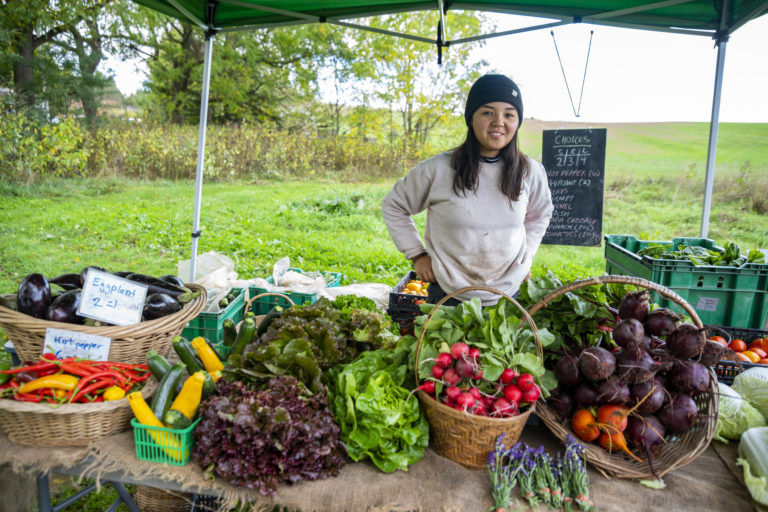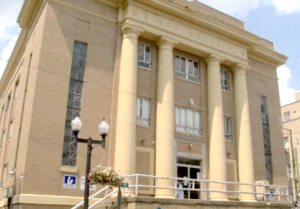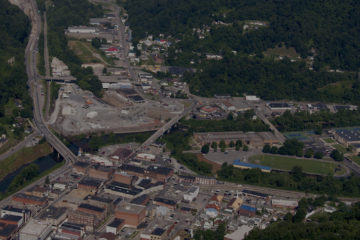When I talk to people about food insecurity in their communities, there’s always a need for “more.” More money, more transportation, more volunteers, more fresh food, more organizing, more communication. While hundreds of West Virginians work tirelessly every day to feed their neighbors – often unpaid or severely underpaid – it’s clear the systems we have are not enough to fill such a large need.
Without a doubt, this need for “more” exists for almost any health issue in the Mountain State. We need more health clinics. More specialty providers to care for conditions like diabetes and heart disease. More treatment facilities for people who use drugs. More clean water. More doctors and nurses and therapists.
West Virginia is an impoverished state, and it’s impossible to ignore the connection between poverty and a lack of access to healthy, affordable, fresh food. Also impossible to ignore is how this lack of access exacerbates both acute and long-term health outcomes for our state’s children and the adults they will grow into.
We lead the nation in nearly all categories of diet-related diseases, including diabetes, obesity, hypertension and heart disease. Clinicians across the state have told me that they are seeing more children diagnosed earlier with more serious cases of diabetes and other diet-related diseases than in the past, and they don’t know how to implement long-term solutions.
These are diseases that will likely impact children for the rest of their lives. They will dictate how they live, the choices they make and, unfortunately, some opportunities afforded to them.
A few weeks ago, I spoke to a doctor who rotates clinical shifts throughout Southern West Virginia and other parts of Appalachia. This doctor, a West Virginia native, sees hundreds of kids a year for well-child visits in often poor, rural areas. More than half of those visits, they told me, involve parents who are frustrated and scared and who don’t know how to teach their children better habits because the options to build those habits aren’t accessible to them.
“It’s not like we have a bunch of parents who are indifferent about their children’s health and are being careless. They’re often doing the best they can in an impossible situation,” they told me. “As [health care providers] I wish we could do more, but we have to be cognizant that many of the patients we see are not able – because of systems out of their control – to make these huge lifestyle changes. Sometimes, the best we can do is educate and point them to help, but where do you point [in a community] where the help doesn’t exist?”
Sometimes, the best we can do is educate and point them to help, but where do you point [in a community] where the help doesn't exist?"
They made it clear to me that this isn’t necessarily a West Virginia-centric issue, or even an Appalachian one. It’s American, but the reality is there are factors in West Virginia and Appalachia that make the challenges harder to overcome and the resources harder to access.
“People here are proud, and often they don’t like to ask for help no matter how much they need it,” said Keith Blankenship, the administrator at the Mingo County Health Department. “There’s a stigma, I think, that sometimes comes with asking for help and letting others know you need help. I think really, [as health care entities] we need to work on improving the trust between us and our communities.”
When COVID-19 hit, Blankenship said, all the Health Department’s norms were thrown out the window. They began doing new things in new ways.
“We left our building and started meeting people where they are instead of having them come to us,” Blankenship said. “It felt, even as [the pandemic] continues, that that made a difference. They seemed more comfortable telling us about their challenges and had more faith that maybe we could help.”
Though the Mingo County Health Department does not directly deal with food insecurity or provide services to alleviate it, Blankenship said the impact on his community’s health is clear.
“The bottom line is that when someone is hungry, you can’t solve any of their other problems. When someone is facing unrelenting hunger, when it doesn’t go away, we cannot ask them to concentrate on any of the other problems they’re having, to get their vaccines or go to a check-up for some other health condition,” Blankenship said. “Food insecurity is the foundation of everything, and we need to solve it on a broad basis. Food insecurity really is where it all begins and where it all connects.”
In Mingo County, a network of food pantries offer resources on a rotating basis. But many people are “on islands,” Blankenship said, in communities with no easy access to rotating pantries. They often don’t know when they’re held. And without transportation to get there, it doesn’t really matter.
Dr. Dino Beckett, a physician who runs the Williamson Health and Wellness Center, has been heavily involved in trying to improve food access for everyone in his community.
Farmers Markets in the county are well attended, he said, and fill a gap. There have been efforts made to better educate children on healthy eating and understanding where their food comes from.
“I think we see that once kids become involved, they want to be involved, and we need them to be because they are the future of what we’re trying to create,” Beckett said. “We can talk all we want about healthy eating, but you can’t do that if you don’t have access to healthy food. And it’s not just access, it’s a bunch of things working together and we need to continuously be identifying where we need to put our work and our efforts.”
When the kids are engaged, they start thinking critically about things like fresh food, Beckett said. They bring the information home and discuss it with their parents or caregivers. They can maybe influence what their guardians bring home from the store and what their entire families eat. They can advocate for themselves to policymakers about the need for more services and the consequences they face when they’re forced to go without.

Eventually, these will form habits that they can pass on to their own children and so on.
I think often about how many good ideas – some life-changing ideas – I’ve heard floated by regular people in passing throughout the coalfields. They span from food drop-in centers, and volunteer-based ride shares to access far away social services and health services to revitalization projects, film festivals, community co-ops and so much more.
There is no shortage of ideas that would improve life for thousands of our neighbors and friends, thought up by them. I have to imagine the children of West Virginia, who often without realizing it face the worst of these challenges and potentially take on the long-term consequences others were spared from, have their own ideas on how we could improve their lives as well as our’s.
We need to listen to the children in this state and involve them in our policies and decision-making. We must take the time to educate them on how they have the power to advocate for themselves and to demand better from their policymakers.
And yes, we do need more doctors and health care services in West Virginia. There needs to be more affordable grocery stores in our rural communities, and more transportation options to get people there. Ultimately, though, we need to ensure our lawmakers understand how much food insecurity affects the children in our lives. They must be pushed to do more to help these kids live the healthy lives they deserve to live, not be complicit as children are forced into “impossible situations” that impact the rest of their lives.
Caity Coyne is our correspondent for The Health and Hunger Project. Learn more and join us for this year’s summit by registering on the project’s webpage.





0 Comments